Wow! A pre-dynamic thread. I made a new book where you can peek at quotes:
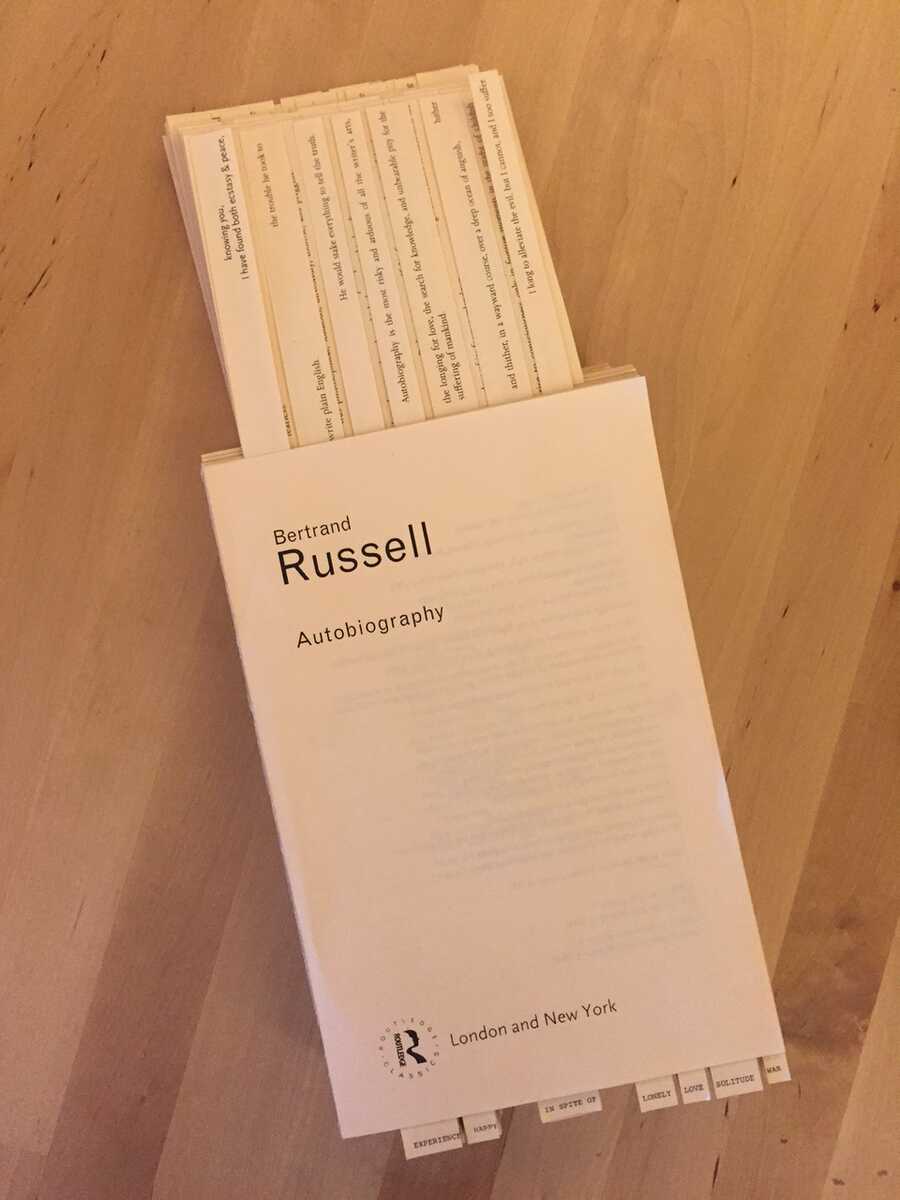
The quotes feel good to touch:
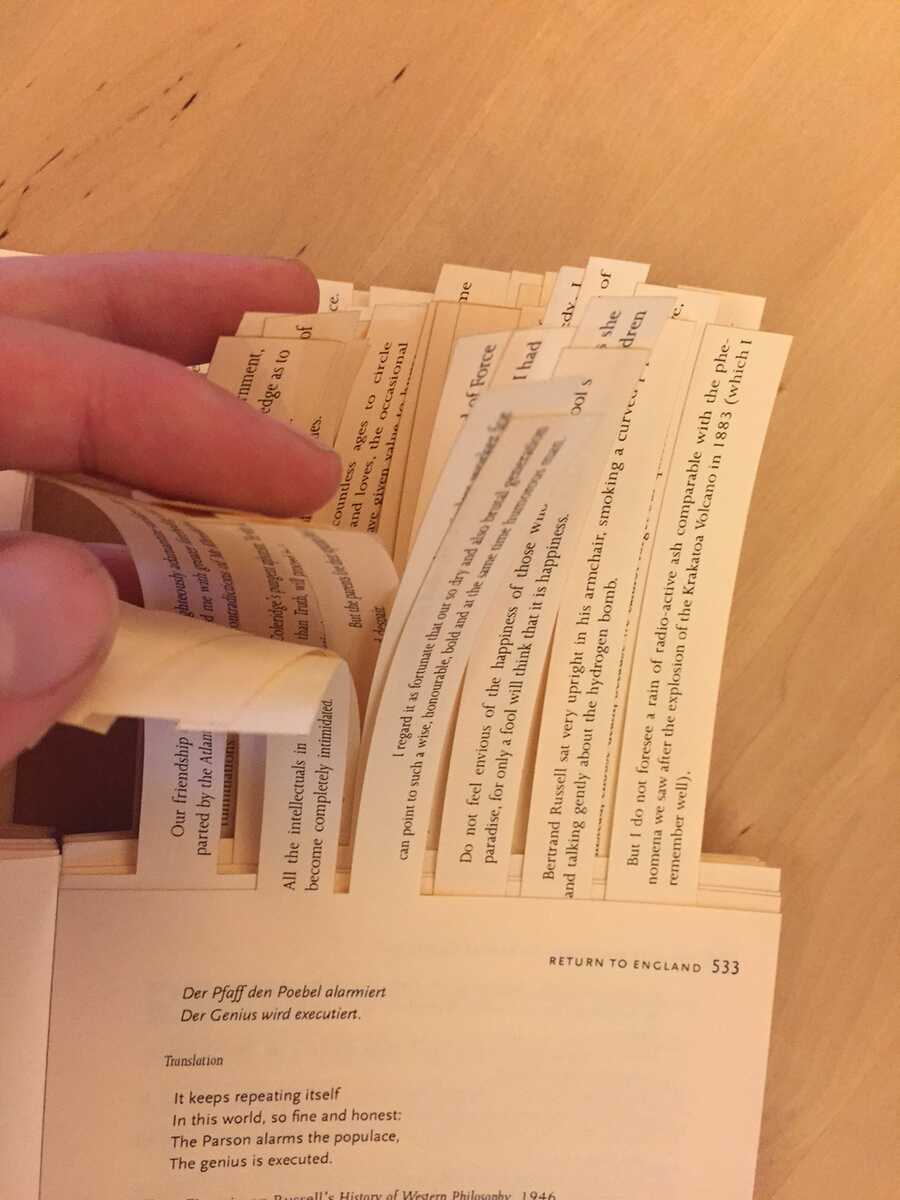
And take you to their context within (where they are grayed out):
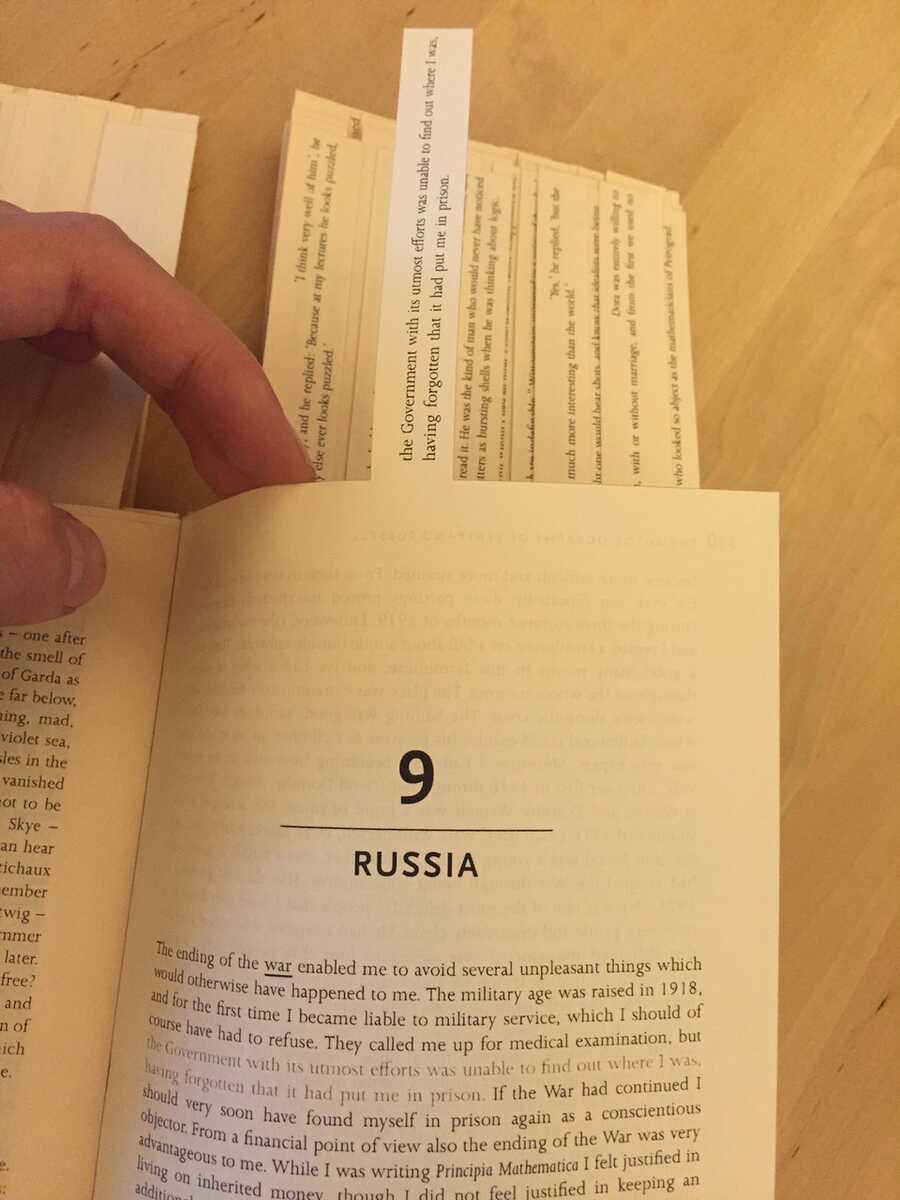
The underlines refer to an index:
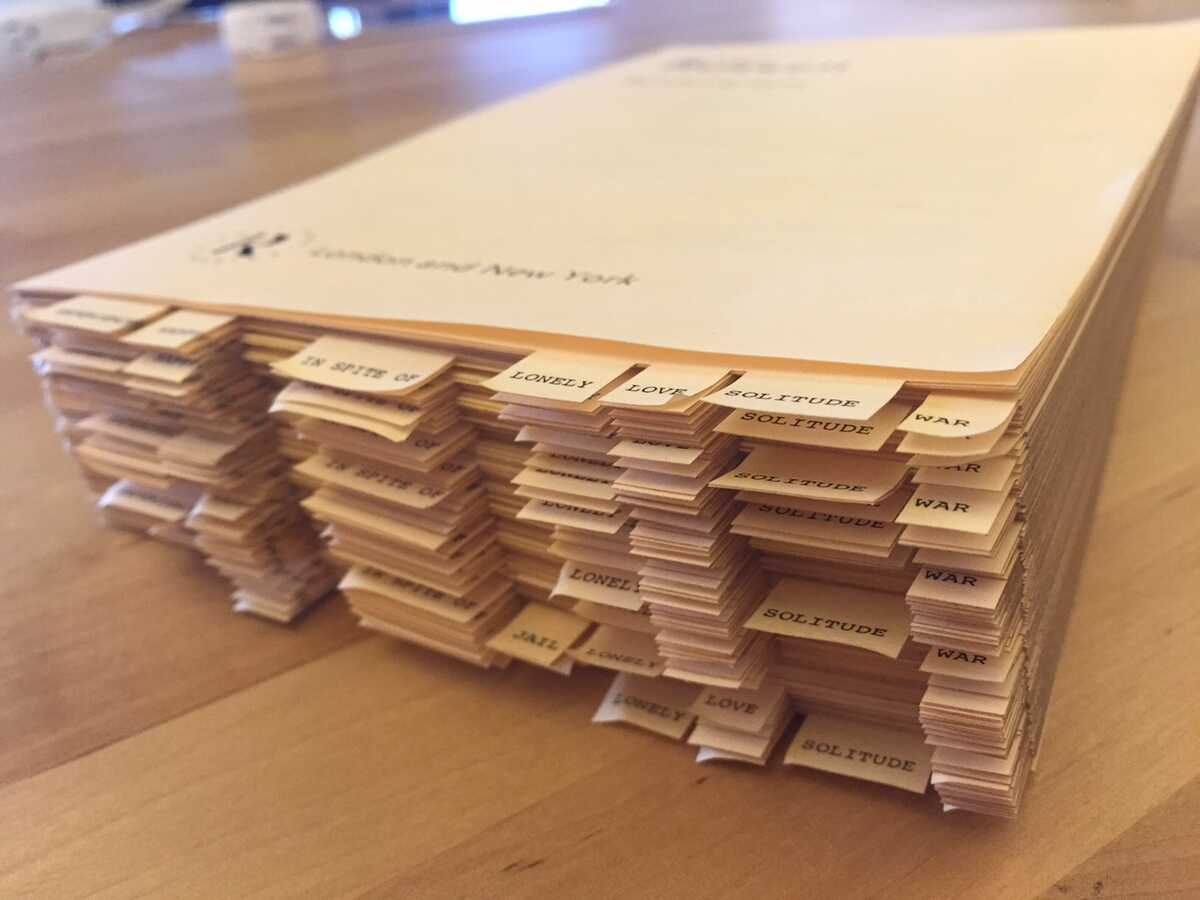
Each page was individually cut with a unique (programmatically generated) vector cut pattern:
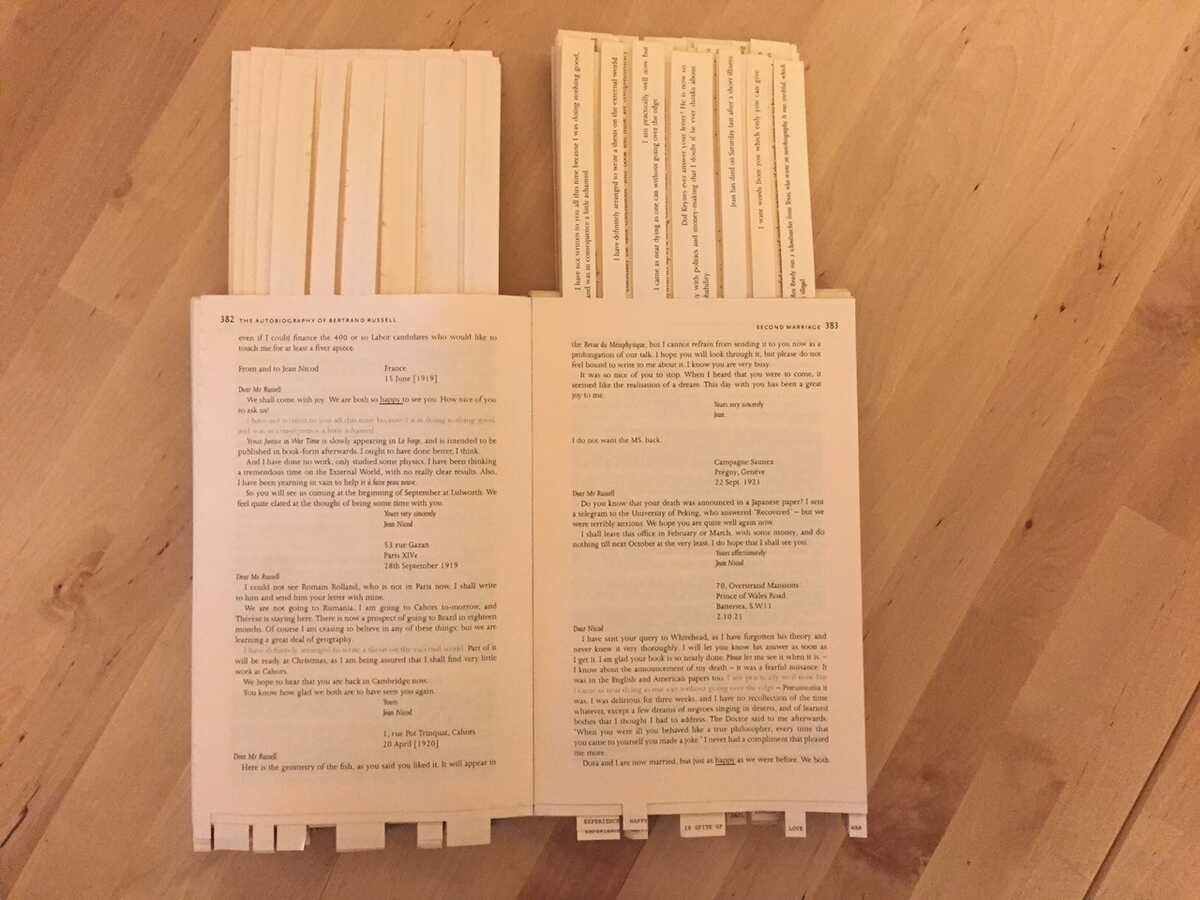
Production was quite a tizzy:

The book will be on view at CDG until Tuesday afternoon. It will then disappear forever.
RMO
> On Dec 4, 2014, at 1:46 AM, Robert M Ochshorn <****************> wrote:
>
> [0] (DC)
> The ease of the “I’d like to see a bit more of this” gesture in this
> prototype is delightful.
>
> [1] (RMO)
> It's indeed delightful, that's the right word for the gesture, but
> perhaps most enchanting[2] to me was the slithering back into place of
> the "OK I've seen enough" retraction[3].
>
> [2] (OED)
> (A)
> enchanting, ppl. a.
> 1. That enchants or lays under a spell.
> 1555: Eden Decades W. Ind. (Arb.) 53 “Stoppe thyne eares from..the
> inchauntynge mermaydes.”
> 1590: Greene Fr. Bacon (1861) 172 “The enchanting forces of the
> devil.”
>
> (B)
> enchanting, ppl. a.
> 2. Charming, delightful, enrapturing.
> 1606: Shakes. Ant. & Cl. i. ii. 132, “I must from this enchanting
> Queene breake off.”
> 1872: Morley Voltaire (1886) 120 “No spectrum analysis can decompose
> for us that enchanting ray.”[5]
>
> [3] (WP)
> (A) The history of cognitive load theory can be traced to the
> beginning of Cognitive Science in the 1950s and the work of
> G.A. Miller. In his classic paper, Miller was perhaps the first to
> suggest our working memory capacity has inherent limits. His
> experimental results suggested that humans are generally able to hold
> only seven plus or minus two units of information in short-term
> memory. And in the early 1970s Simon and Chase were the first to
> use the term "chunk" to describe how people might organize information
> in short-term memory. This chunking of memory components has also been
> described as schema construction.
>
> (B) In the late 1980s John Sweller developed cognitive load theory (CLT)
> while studying problem solving. Studying learners as they solved
> problems, he and his associates found that learners often use a
> problem solving strategy called means-ends analysis. He suggests
> problem solving by means-ends analysis requires a relatively large
> amount of cognitive processing capacity, which may not be devoted to
> schema construction. Sweller suggests that instructional designers
> should prevent this unnecessary cognitive load by designing
> instructional materials which do not involve problem solving. Examples
> of alternative instructional materials include what are known as
> worked-examples and goal-free problems.
>
> [4] (DC)
> My first thought after perusing this a bit: what happens when you are
> reading a quote which itself quotes something?[7]
>
> [5] (RMO)
> Imagine "Peek Quotes"[6] applied to all of the OED etymology excerpts?
>
> [6] (RMO)
> Alan's "Power of Context" would be another good name for this tool,
> or else for some sort of research umbrella covering many related
> efforts at source/tool/process-transparency.
>
> [7] (RMO)
> I had a similar desire to burrow deeper and deeper and also laterally
> (to other "peek quotes" compilations transducing[8] different subsets?)
> but I was glad that the recursion wasn't the end goal.
>
> As deeply intertwingled as everything[9] may be, being open to every
> reader's own agendas, interests, and backgrounds is not exactly the
> same thing as substituting "authorship" for a worldmap on the desert
> floor laid out in 1:1 scale. To create an environment, or zone if you
> will (ie. for proximal learning?) is still to design, which is to say
> deliberate over, space.
>
> [8] (ispell)
> let AUTOCORRECT sub {"transducing" -> "transfusing"}
>
> [9] (MEEK QUOTE "Everything," comp. RMO)
> (A - Ted Nelson)
> Everything is deeply intertwingled.
>
> (B - Joseph Jacotot)
> Everything is in everything.
>
> (C - m. qt. comp. K Wodiczko)
> (i. V. Lenin)
> Everything is a priority.
>
>
> Your intertwingled[10] correspondent,
> R.M.O.
>
>
> [10]
> (A) intertwined
> (oed)
> 1. trans. To twine (two or more things) together, or entwine (one
> thing) with another; to unite by twining; to interlace, intertwist,
> interweave.
> 1641: Trapp Theologia Theol. 357 “The word..signifieth thoughts so
> perplexed and inter-twined one within another, that there is no way
> out almost.”
> 1671: Milton P.R. iv. 405 “Under some concourse of shades, Whose
> branching arms thick intertwin'd might shield From dews and damps of
> night his shelter'd head.”
>
> (B) intermingled
> (oed)
> 1. trans. To mingle (two or more things) together, so that each is
> mixed with the other; also, to introduce and mix (an element) with
> another or among other things.
> 1555: Eden Decades 143 “Let vs nowe entermyngle certeyne smaule
> thynges amonge these great matters.”
> 1712: Steele Spect. No. 272 1 “Crowds of forlorn Coquets who
> intermingle themselves with other Ladies.”
> 1803: W. Taylor in Ann. Rev. I. 419 “A cause of displacing and
> intermingling the people.”
> 1842: H. Rogers Ess. I. i. 36 “Fuller has intermingled a great deal of
> gossip and rubbish with his facts.”
>
> [11]
> "disintertwinglement"?